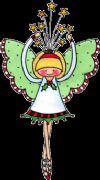|

Vickiii

|
Observations
|
|
do other people have problems with the following:
I have a doubt. This is such a common phrase amongst second language english speakers. I was wondering if any native speakers use this phrase. I would generally say:
"Excuse me, I am not sure about ..." or "I have a question" or "Can you explain..."
I was wondering where the phrase has come from as I see it written in the forum a lot and I also hear it from other teachers and students alot (only from 2nd language speakers - not 1st language speakers) I was wondering if it is North American or english? (me being neither and all!)
The second point: Does anyone have anyway to help people remember Island is actually pronounced iland - with no ssssss? After a whole school year of teaching conversation my students today came out with Isssssland! I couldn�t beleive I had not been effective in teaching the correct pronounciation!
Look forward to comments
Vickiii
I was sent a private message by one teacher. I think she is brilliant she suggested to:
Draw a picture of an island shaped like an Eye - Eyeland.
How cool is that!!!
|
21 Nov 2008
|
|
|
|

graace

|
|
Hi Vickii,
I would say "I have a doubt" is not generally used by native speakers, although I can only vouch for the UK, not sure about the US.
The sentence "Ireland is an island" could possibly help...? |
21 Nov 2008
|
|
|

Zora

|
|
No, not me...I don�t use it but it is used a lot in Spanish when people need something clarified and they say "Tengo una duda, me puedes explicar..." I think it�s a literal translate thing.
|
21 Nov 2008
|
|
|

spring

|
|
Hi Vickii,
I am not a native,but I commanly see this phrase on the forums.(Not only in this site)
"I have a doubt about....." or "I doubt...."
I am not sure but I might have heard it from US movies too.
What I mean I have never thought it may be wrong:)) cos I thought natives also use this phrase. There seems to be no problem,many people use it.I even see some discussions about the usage of this phrase on the net.
|
21 Nov 2008
|
|
|

libertybelle

|
In the States we say; (I�m from California)
I have doubts about this or that...
or
I have my doubts..........
or
I�m not so sure about that...............
or
(said with a bit of sarcasm)
I doubt that very much....
or
I�m in doubt about this or that.
Hope this helps.

|
21 Nov 2008
|
|
|

Mietz

|
I�m German, but I wouldn�t say that. I�d use "I have my doubts about smth.", but that�s a different context.
I do know the "island-problem". It�s not your fault! My students keep ordering "Long-ICEland-Cocktails" and the best were the "freed chicken wings"...
|
21 Nov 2008
|
|
|

spring

|
|
By the way Vickii I am still trying to teach my Ss how to pronounce "knight,knife..."
Many times they pronounce the sound "k" instead of "n".. and this always makes me smile and a little bit angry:))
Don�t worry as Mietz said;it is not your fault..
|
21 Nov 2008
|
|
|

Vickiii

|
|
thank you for your feedback.
Hey Liberty - we also use those phrases in New Zealand - it is such a mixture of both american and UK english!
I had never considered the literal translation from Spanish - BTW - thank you for my spanish phrase of the day Zora - now i don�t have to go find one to learn! I was saying �Tengo una pregunta� which probably sounded funny as anything to the Chilians - but just like me with my students - was never corrected as it was understandable! works both ways huh!
good point Spring - I am also struggling with answer - pronouned "ans...Wer" I really should go work on some posters for these crazy english anomalies! I don�t know how on earth english got picked as the international language - it is completely crazy!!!
Thanks people
|
21 Nov 2008
|
|
|

frenchfrog

|
|
And what about �hair� pronounced �air�, not to mention �sheet� pronounced �shit� and �beach� like �bitch�...
|
21 Nov 2008
|
|
|

pitudiaz

|
|
Spring, try a drawing of a knife cutting a "K" and another of a knight fighting against a "K" : ) |
21 Nov 2008
|
|
|

spring

|
|
Wowww...
This is a very good idea Pitudiaz.
I will definitely draw..
If one day you see my pictures in an exhibition,do not get surprised cos I may be an artist or pantomimist (if I go on this way.)
Trying not to use native language in the class,I gained new skills:)))))
|
21 Nov 2008
|
|